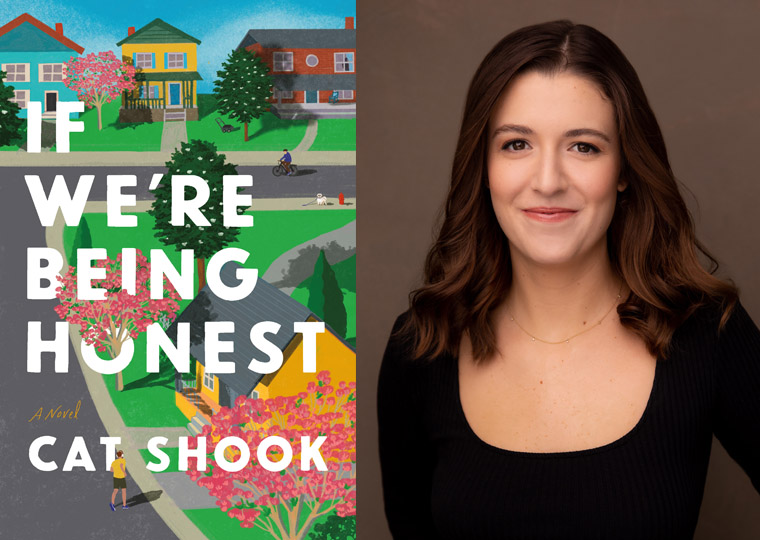If We’re Being Honest follows the Williams family the week after they bury their beloved patriarch, who has suddenly and unexpectedly died. During the funeral, a long-held secret is revealed that shakes each family member and brings their own secrets to the surface.
Celadon Books: Congratulations on a wonderful debut novel! How did you come up with the idea for If We’re Being Honest?
Cat Shook: Thank you! This may make it sound like I should be institutionalized, but the novel started coming together because I could hear the characters having conversations with each other in my head. I asked myself who these people were, and then the story started taking shape from there.
CB: The novel centers around three generations of the Williams family, who have gathered to grieve the loss of their beloved patriarch. Who was your favorite character to write? And with which character did you feel the most personal connection?
CS: The most fun character to write was definitely Carol Anne, just because she’s so absurd. I feel really connected to all of them, though, even Carol Anne. While none of the characters is based on anyone in my real life, I will say that I identify the most with Delia. We share a lot of the same flaws!
CB: Each character goes on their own journey of self-discovery in the aftermath of the funeral and its shocking revelation. Although grief and loss are central to the plot, what other themes did you set out to explore through the various family members’ stories?
CS: It’s funny, because in writing the book, the only thing I was really interested in exploring was the characters. It was much more a process of discovering who they were than it was setting out to write a book about a larger theme. But when the first draft was finished, I realized I had written a book about infidelity; every character has their own brush with it in some way.
But I think the biggest theme is love, and the idea that love (romantic, familial, friendship) doesn’t always look how you think it will, especially in relationships that have existed for a long time. But does that make it any less meaningful?
CB: You wrote this book while also working full-time at a literary agency. What advice would you give to future authors who aren’t sure where to start the process?
CS: I’m interpreting this as a two-part question, because there’s the process of writing a manuscript and then the process of trying to get it published. My advice for the first part is to do whatever you need to do to hold yourself accountable to actually write. I try to steer clear of one-size-fits-all advice for that, because everyone has different lives, schedules, and motivating factors, but what I would say is find some way to incorporate accountability into your life. For me, I told a few close friends I was working on a book, one of whom was my roommate at the time. I wrote the majority of this book during lockdown, so that roommate would pointedly ask me every day if I had written, and I can’t emphasize enough how much not wanting to tell him “no” helped me finish my first draft.
As for getting published, once you have a manuscript (not an idea) you feel good about, the best thing you can do is try to find the right agent. I was extraordinarily lucky to have already been friends and colleagues with my agent, so I already enjoyed a front-row seat to see how brilliant she is and how the whole process works. For those who aren’t sure who they want to represent them, I’d recommend looking in the acknowledgments of books you think are similar to yours to find out who represents those books, then trying to track down their email addresses to query them. And start your query with a compliment about the book they’ve repped that you love!
CB: What do you hope readers take away from If We’re Being Honest?
CS: It still blows my mind that I’m going to have readers! I will be so curious to hear what people take from it, and I am too nervous to tell anyone how to feel about it. But what I will say is that for me, the beating heart of this book is the idea that love doesn’t always go how you think it’s going to and it’s not always going to fit into a traditional mold, but that does not lessen its value. Our ideas about love can be reframed, and there’s beauty in that.


